 iCoast
iCoast
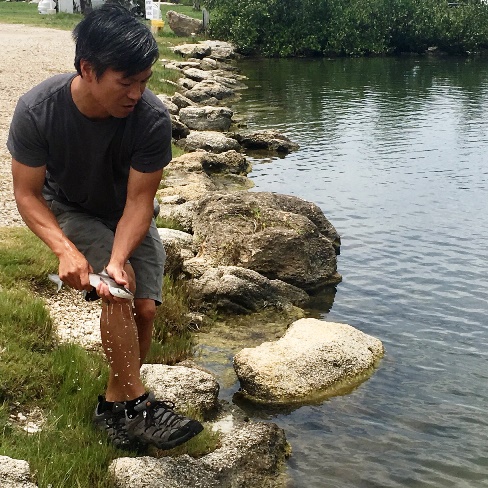
The Liao Lab will contribute to the iCoast program by leveraging biology to augment the existing, hardware-based, autonomous maritime monitoring capabilities currently being developed by UF Engineering. Our program will tap into fish and other marine organisms’ innate abilities to sense and respond to perturbations in their environments (red tide, hurricanes, etc.), with the idea that these organisms have evolved for millions of years in these habitats, and are uniquely sensitive to abiotic and biotic changes that stimulate their migration and physiological states across seasons. Leveraging the sensory capabilities of these organisms as “canaries in the coal mine” makes great sense: biological organisms are cheaper, more sensitive, do not foul, are self-replicating and largely self-sustaining, do not need deployment, and run for longer than any mechanical device that humans can currently manufacture. What is required is the ability to translate and interpret observed behaviors from a biomechanical and neurophysiological perspective. This is the expertise of the Liao Lab, which is poised to provide persistent undersea surveillance with a minimal logistical footprint.
Dr. James Liao is an Associate Professor in Biology, UF Term Professor 2016-2019, Affiliate Professor in the Crayton Pruitt Family Department of Biomedical Engineering, and Affiliate Curator of Ichthyology at the FLMNH. He joined the UF Faculty in 2009 after being an NIH NRSA postdoctoral fellow and research associate in the Neurobiology and Behavior Department at Cornell University. Prior to that, Dr. Liao received his M.A. and Ph.D. in Biology at Harvard University, where he was recognized with multiple Derek Bok Excellence in Teaching Awards. His undergrad was at Cornell, James Cook University (Australia) and Wesleyan University (96' magna cum laude).
The research of Dr. James Liao looks at the physics and neuroscience of how animals sense and navigate the world. One component of his research looks into how fish can recapture the energy of turbulent flows to provide insight into how to better build underwater robots. He is currently extending this work to better understand the sensory capabilities and migratory behaviors of wild fishes in north Florida. Another part of his research looks at the organization and function of neurons in the lateral line hair cell system in fish. These hair cells are identical to those found in human ears but are much more experimentally accessible. Powerful technological and genetic advances make it possible for the first time to look into the nervous system of living vertebrates and ask questions related to human deafness and balance disorders.
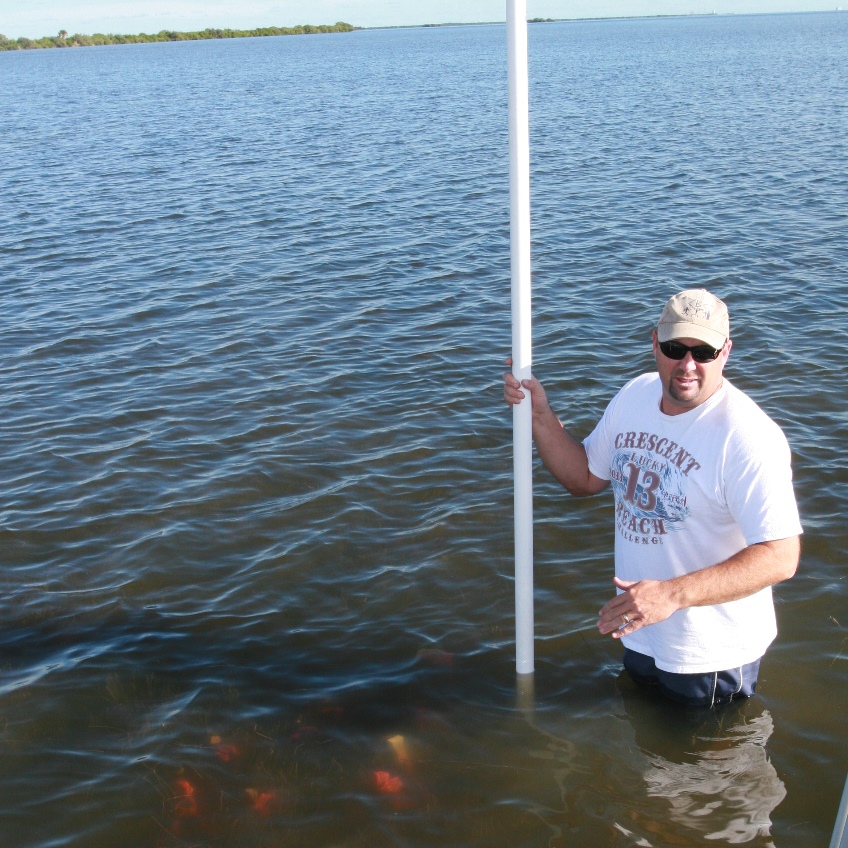
Whitney Laboratory / Institute of Food and Agricultural Sciences
My role on the iCoast project is one of leadership as one of the four core members of the program. My area of expertise in in coastal environmental sensing for water quality, biogeochemistry, and nutrient dynamics. I also lead the Whitney Laboratory effort and will oversee all logistics and sensor deployment / data collection within the Matanzas River and Pellicer Creek Estuary.
Dr. Todd Osborne has a diverse research program focusing on biogeochemical processes in soil and water in a variety of ecosystems throughout Florida. Currently, he is highly engaged in climate change science with several projects investigating biogeochemical cycling of carbon, nitrogen, sulfur and phosphorus within estuarine ecosystems along a climate change gradient in Florida. His research initiatives include carbon dynamics in mangrove and saltmarsh ecosystems, nutrient limitation in tropical mangrove Ecosystems, climate change induced changes to ecosystem processes (landscape scale biogeochemical processes). He is also very active in coastal ecosystem research dealing with sea grass and mangrove habitat restoration and mitigation.
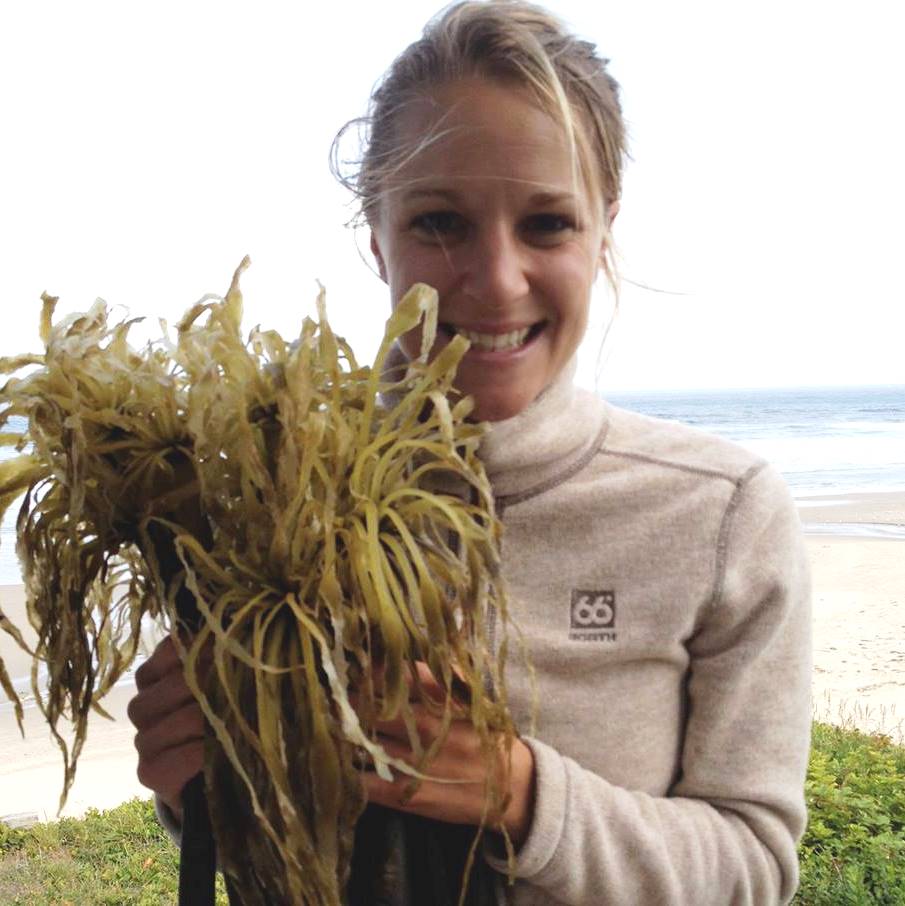
Angelini and her graduate student, Lauren Brisley, are working with a team of citizens scientists organized through the Guana Tolomato Matanzas National Estuarine Research reserved to continuously monitor boat and wildlife traffic along the Intracoastal Waterway, just out the back door of the UF Whitney lab. Through their deployment of a solar-powered video monitoring system, they are acquiring novel insights to both boat and wildlife (e.g. Dolphins, manatees, turtles, birds) composition and behavior along this high traffic corridor, information that will be essential for understanding how boats may alter the transport and fate of pollutants in the system and when and where pollutant plumes may be most likely to interact with wildlife of particular management and conservation interest in the region.
Christine Angelini is an Assistant Professor in Environmental Engineering Sciences at the University of Florida. She joined the UF faculty in 2014 after receiving her PhD in Biology from the University of Florida in 2014 and her BSc in Marine Biology from Brown University in 2009. She is a coastal and conservation ecologist with expertise in coastal wetlands, reefs and dunes. Her research focuses primarily on advancing mechanistic understanding of how species interactions moderate ecosystem resilience to climate change and influence contaminant fate and transport. She works extensively with natural resource managers to integrate this knowledge into coastal management strategies and ecosystem restoration designs. Angelini is co-leading the new iCoast transdisciplinary initiative at UF, which seeks to innovate strategies for detecting and managing threats to human and wildlife health in coastal environments and is developing novel strategies to rapidly rebuild coastal dunes after hurricanes for shoreline protection. She is an NSF CAREER award recipient and an Associate Editor at the Journal of Ecology.
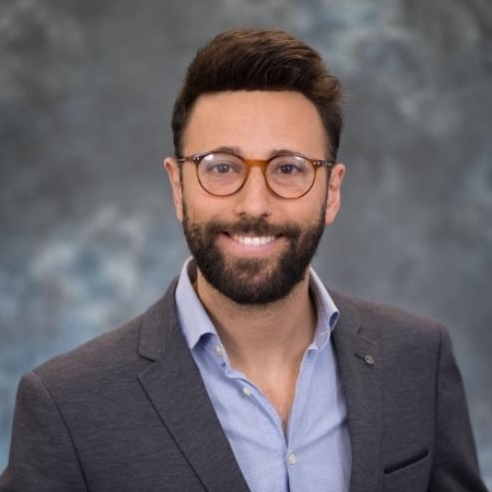
Canestrelli and his graduate student, Daniele Pinton, are working on the development and calibration of a coupled hydrodynamic and water quality model for studying the dispersal of pollutants in Guana-Tolomato-Matanzas estuary, with a particular focus on the bacterium named E. Coli. The model will help them understanding how diverse weather and tidal conditions affects the resident time of E. Coli in the estuary and in the adjacent beaches. It is important to know how bacteria disperse in coastal waters, since as a result of exposure to bathing water contaminated by fecal bacteria humans could experience gastrointestinal and respiratory illnesses.
Alberto Canestrelli is an Assistant Professor in Environmental Engineering Sciences at the University of Florida. Fascinated with natural phenomena involving water flow and its interaction with the surrounding environment, Dr. Canestrelli studies the long term modeling of the morphodynamic evolution of river estuaries and back barrier basins, with a particular focus on salt marsh erosion and progradation. His research also focuses on the storm surge forecast, and on modeling of the long term evolution of beaches, with a particular focus on beach recovery. He is also studying the impact of crab grazing on the hydrodynamics of tidal creeks, in collaboration with Prof. Christine Angeline. Finally, he is interested in the modeling of nutrient dispersal in estuarine waters by means of tides and waves.
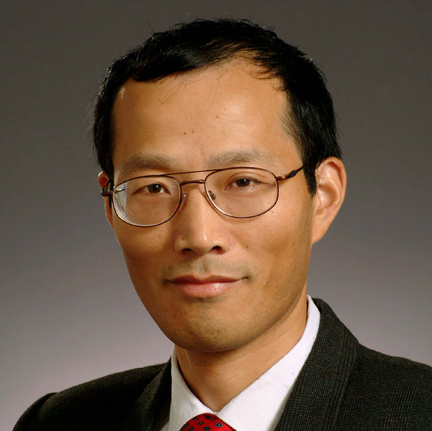
Dr. Fan is working on the development of a platform consisting of sample preparation and molecular detection of bacteria in water with minimum intervention, with an ability to integrate with a drone or other sampling vehicles.
Dr. Hugh Fan is the George N. Sandor Faculty Fellow and a Professor of the Department of Mechanical and Aerospace Engineering, J. Crayton Pruitt Family Department of Biomedical Engineering, and Department of Chemistry. Prior to joining UF in 2003, he was a Principal Scientist at ACLARA BioSciences Inc. from 2000 to 2003 and a Member of the Technical Staff at Sarnoff Corp from1995 to 2000. He worked as a postdoctoral fellow at the Ames Laboratory of the US Department of Energy at Iowa State University in 1994. Dr. Fan’s research interests include microfluidics, BioMEMS, sensors, cancer diagnosis and prognosis. He has authored >90 journal articles that have been cited for more than 5600 times. In addition, he edited one book published by Wiley and authored over 60 book chapters and referred proceeding articles. Dr. Fan’s research efforts have been recognized by Fraunhofer-Bessel Award from Alexander von Humboldt Foundation (Germany), E.T.S. Walton Award from Science Foundation Ireland, and Career Award from National Institute of Health (USA). He is an elected Fellow of the American Association for the Advancement of Science (AAAS) and Fellow of American Society of Mechanical Engineers (ASME), an editor of Microsystems & Nanoengineering (Nature Publishing Group), and an editorial board member of Scientific Reports (Nature Publishing Group).

.jpg)
Dr. Kaplan developed the initial iCoast proposal and is co-leading the initiative.
Dr. David Kaplan is an Associate Professor in the Department of Environmental Engineering Sciences within the Engineering School of Sustainable Infrastructure and Environment at the University of Florida and Director of the H.T. Odum Center for Wetlands. Research in Dr. Kaplan’s Watershed Ecology Lab (www.watershedecology.org) focuses on linkages among the hydrological cycle, ecosystem processes, and human activities, with the goal of advancing natural resources conservation and management. He has worked extensively with water and environmental management agencies to tie hydrological modeling to ecological outcomes, predict restoration effects, and guide water management decision-making. Dr. Kaplan is a 2017 UF Water Institute Early Career Faculty Fellow, a 2017 UF Term Professor, and an organizing member of the NSF-funded Amazon Dams Network.
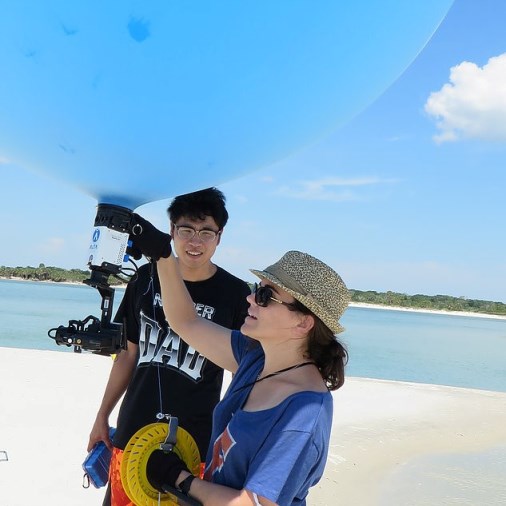
Olabarrieta and her graduate students, Luming Shi and Chu-En Shu, are working on the development and establishment of a coupled wave-hydrodynamic-ecologic forecast modeling system within the iCoast project. This forecast system is being stablished and tested in the Guana-Tolomato-Matanzas estuary, and it will be used to forecast surfzone hydrodynamics, impacts of storms (erosion and flooding) and water quality. The forecast system will be used to gain understanding of the dynamics of the estuary under diverse weather conditions. The information provided by the forecast model will serve to stablish a warning system against the impacts of storms, algal bloom outbreaks and excesses of water pollution.
Maitane Olabarrieta is currently an Assistant Professor at the Civil and Coastal Engineering department at the University of Florida. She received her Ph.D. from the University of Cantabria (Spain) in 2006. Her research interests cover diverse oceanographic and long-term morphodynamic evolution problems that affect our coasts. By combining remote and in situ measurements and numerical modeling, she and her students study processes with a wide variety of spatial and temporal scales, including momentum exchange processes during hurricanes and extreme storms, the generation mechanisms of meteotsunamis, short-term estuarine transport processes, wave-current interaction, inlet dynamics and the long-term evolution of tidal networks and inlets. One of the main goal is to improve numerical models used to predict the transport of pollutants and sediments in inlets, coastal change, erosion and flooding. Within the Coastal Morphodynamics Lab, undergraduate and graduate students combine advanced numerical modeling, field surveys and remote sensing to analyze the feedbacks between the hydrodynamics, sediments transport and coastal morphology. During her research career, Olabarrieta has collaborated with several research groups from Europe, the United States, New Zealand, China, and Australia. In 2015 Maitane received the NSF CAREER Development Award, which has provided her the unique opportunity of analyzing the morphodynamic evolution of mix-energy inlet systems.
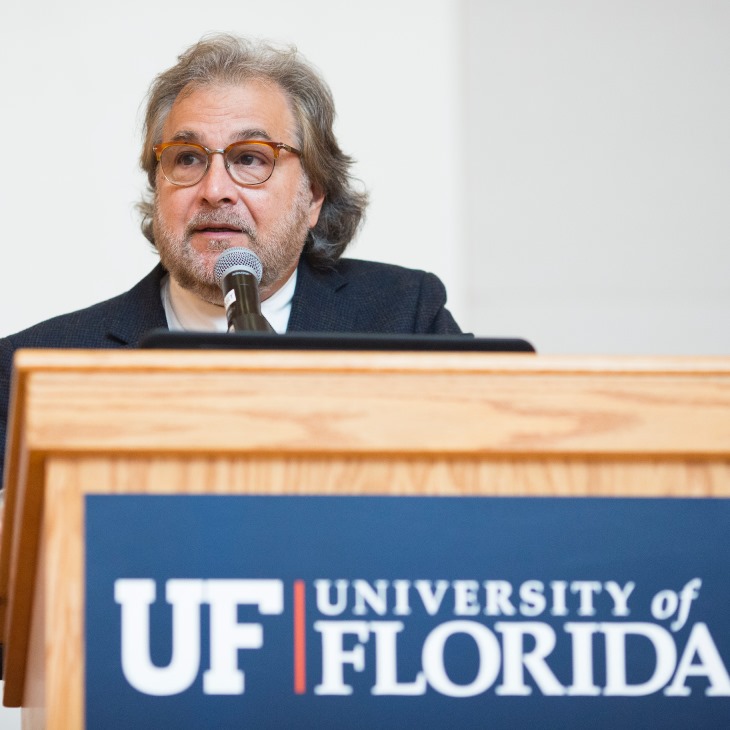
Dr. Bianchi will be using chemical biomarkers to track input of local septic systems in the St. Augustine region. Sterols have been shown to effective chemical biomarkers of different sources of organic matter in coastal systems. In particular, their application in tracing the sources of sewage and waste waters inputs has become more common in recent years. Here, we use coprostanol, and other related derivative sterol compounds, as tracers of sewage inputs to the Matanzas River. We will track sewage sources (e.g., agriculture versus human) by analyzing sterols in both dissolved and particulate organic matter (from surface and bottom waters), as well as in select surface sediments. Sterols (analyzed using GC-MS-MS) will also be linked to other measured parameters in this study such as, dissolved inorganic nitrogen, the relative abundance and strains of E. coli and, human-sourced hormones.
Thomas Bianchi is a full professor and holder of the Jon and Beverly Thompson Endowed Chair in Geological Sciences at the University of Florida (UF), Gainesville, Florida. Before joining UF I held full professor positions at Tulane University and Texas A&M University. My general areas of expertise are organic geochemistry, chemical oceanography, and global carbon cycling in aquatic ecosystems. I have published over 220 articles in refereed journals and am sole and/or co-author of 7 books, with another book on Chemical Oceanography of the Gulf of Mexico - due out in 2019. I am currently Editor-in-Chief of the journal Marine Chemistry, and have served as an Associate Editor for numerous other journals. I am the recipient of two Fulbright Research Awards, became a Fellow of the American Association for the Advancement of Science (AAAS) in 2012, and in 2017 was named Geochemical Fellow of the Geochemical Society (GS) and The European Association of Geochemistry (EAG), Fellow of the Association for the Sciences of Limnology and Oceanography (ASLO), and in 2018 was recipient of the Qilu Friendship Medal/Award from the Shandong Province of China.
Many of the central issues in research concerning global climate change involve understanding the exchange and transport of organic and inorganic pools of carbon – in the context of the global carbon budget. If we are to successfully balance and model global carbon fluxes, it is important to understand the dynamics of carbon cycling in the most productive environments. In general, the most productive environments are located in land-margin ecosystems such as watershed soils, freshwater, and marine coastal systems. During the past few years my research has centered on organic carbon cycling from source-to-sink with work focused on the transport of soils in watersheds of large river systems to coastal environments. I have used state-of-the-art techniques to determine the role of terrestrial versus aquatic carbon sources in the overall carbon cycles of these ecosystems.
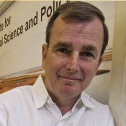
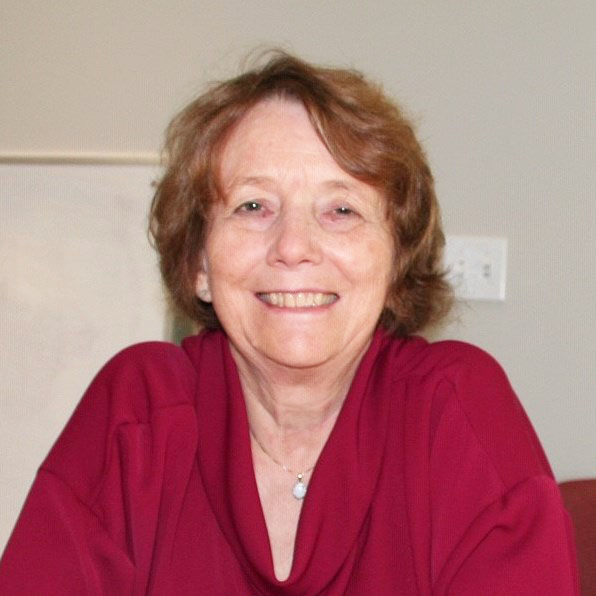
Dr. Denslow will be collaborating with Dr. John Bowden for the analytical determination of contaminants via various types of LC-MS/MS instruments. Dr. Denslow will be performing targeted analytical analyses via LC-MS/MS to determine concentrations of synthetic and endogenous sex steroid hormones in the intercoastal region near St. Augustine. This will be an additional measure of input into the intercoastal system from the sewage treatment facility in St. Augustine and from septic systems along a gradient towards the Whitney Laboratory in Marineland. The specific endogenous hormones to be evaluated include estradiol, estrone, estriol, testosterone, 11-keto-testosterone, and equilin. In addition, synthetic hormones that are usually included in the birth control pill will be evaluated including ethinylestradiol and levonorgestrel. Water and sediments will be analyzed by LC-MS/MS. We will cooperate with Dr. Bianchi’s group to analyze similar extracts.
In addition, Dr. Denslow will use cell-based assays for estrogen, androgen and progestin receptors to measure aggregated activities for these receptors (both sex steroid hormones and industrial contaminants that may mimic ligands for these receptors). This will help identify chemicals of concern using nontargeted mass spectrometric analyses.
Nancy Denslow is a full professor in the Department of Physiological Sciences and the Center for Environmental and Human Toxicology in the College of Veterinary Medicine at the University of Florida. She received her Ph.D. from the University of Florida in Biochemistry and Molecular Biology. Her research focuses on applying molecular methods to understand endocrine disruption in aquatic organisms. She has pioneered the use of transcriptomics and proteomics technologies for non-model species that are vulnerable to environmental toxicants. She served as the past director of the Proteomics Core Facility in the Biotechnology Program at the University of Florida. Dr. Denslow has over 220 peer-reviewed publications and is an inventor on four patents relating to protein factors, biomarkers for endocrine disruption and proteomics methodologies. Her research has been funded by the National Science Foundation, National Institute of Environmental Health Science, US Environmental Protection Agency, United States Geological Survey, the San Francisco Estuary Institute and the University of Florida. Professor Denslow’s teaching responsibilities include graduate courses in Ecotoxicology and Risk Assessment and Toxicogenomics. She has received several awards for her research including the 2007 Pfizer Award for Research Excellence, the 2014 Zoetis Award for Veterinary Research Excellence, the Founders Award, the highest award given for research excellence by the Society of Environmental Toxicology and Chemistry and was the recipient of a Fulbright Specialist award in Environmental Sciences. She was named a University of Florida Research Professor for 2009-2012 and again for 2017-2020. Professor Denslow is a member of the Society of Toxicology (SOT, Molecular Biology Specialty Section, past president, 2014-2015; Reproductive and Developmental Toxicology Specialty Section, past secretary/treasurer), Society for Environmental Toxicology and Chemistry, American Society for Biochemistry and Molecular Biology and the Association of Biomolecular Research Facilities. She has previously served as an Associate Editor for Ecotoxicology and Environmental Safety and for Comparative Biochemistry and Physiology and serves as an ad hoc reviewer for various federal agencies.
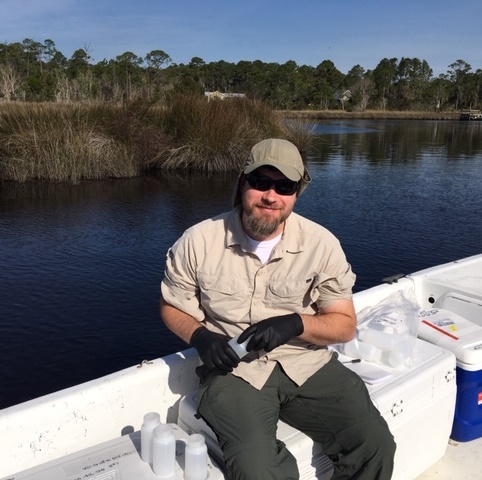
Dr. Bowden will be collaborating with Dr. Denslow to determine chemical tracers of wastewater effluent, septic tank leakage, and other run-off sources in the intercoastal region near St. Augustine. Using novel mass spectrometric techniques, Dr. Bowden will examine surface water and sediment using “targeted” and “nontargeted” liquid chromatographic-tandem mass spectrometry (LC-MS/MS). For the targeted analyses, Dr. Bowden will characterize the site for the presence of per- and polyfluoroalkyl substances (PFAS), synthetic hormones, common-use pharmaceuticals and antibiotics, pesticides, and herbicides, personal care products and food additives. The nontargeted analyses will describe the unknown anthropogenic chemical space of the St. Augustine intercoastal system.
Email: john.bowden@ufl.edu
Phone: 352-294-4063
John Bowden is an assistant professor in the Department of Physiological Sciences and the Center for Environmental and Human Toxicology in the College of Veterinary Medicine at the University of Florida (UF). He also has a joint appointment in the Department of Chemistry at UF in the Division of Analytical Chemistry. He received his Ph.D. from the University of Florida in Analytical Chemistry in 2009. Prior to his current position at UF, he worked as a Research Chemist at the National Institute of Standards and Technology at the Hollings Marine Laboratory in Charleston, SC, in both the Environmental Chemical Sciences and Marine Biochemical Sciences groups. His current research focuses on employing novel mass spectrometric methods at the chem/bio interface, with an expanding interest in the fields of endocrine disruption, environmental chemistry, environmental health, and exposomics. Dr. Bowden also has an expanding expertise in the field of omics and its application to environmental studies. Dr. Bowden has over 42 peer-reviewed publications and is a member of the Society of Environmental Toxicology and Chemistry, American Chemical Society, The American Society of Mass Spectrometry and The Metabolomics Society.